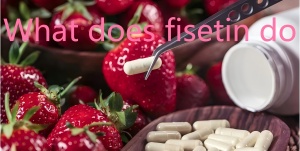What does fisetin do

Ever wondered what fisetin does and why it's gaining so much attention in the health world? You're not alone. This natural compound has been popping up in supplement labels, research papers, and wellness blogs—and for good reason.
What is fisetin?Fisetin is a plant-based flavonoid found in strawberries, apples, grapes, onions, and a few other fruits and vegetables. It’s known for its antioxidant and anti-inflammatory properties. While it’s been around forever in nature, only recently have scientists started to uncover just how powerful fisetin might be for human health—especially when it comes to aging and brain function.
So, what does fisetin actually do? First and foremost, fisetin helps fight oxidative stress. This means it can neutralize harmful free radicals in the body that contribute to aging and many chronic diseases. By reducing this cellular damage, fisetin plays a role in supporting long-term health and longevity.
One of the most exciting discoveries about fisetin is its effect on senescent cells—those old, damaged cells that hang around and cause inflammation. Fisetin helps clear them out, which may promote healthier aging and reduce age-related issues.
But that’s not all. Fisetin is also great for your brain. Research shows it may help improve memory, protect neurons, and support cognitive function. Some studies even suggest that it could be useful in fighting neurodegenerative diseases like Alzheimer’s, thanks to its neuroprotective effects.
Fisetin also shows promise in reducing chronic inflammation, improving cardiovascular health, and supporting metabolic function. Because of these broad benefits, it's now used in supplements aimed at anti-aging, brain health, and overall wellness.
While you can get small amounts of fisetin through your diet, many people turn to supplements for higher concentrations. As always, it’s smart to talk to a healthcare provider before starting any new supplement, especially if you have underlying conditions.
In short, fisetin is a natural powerhouse that may help you age smarter, think clearer, and feel better. It’s still being studied, but the early results are pretty exciting.
